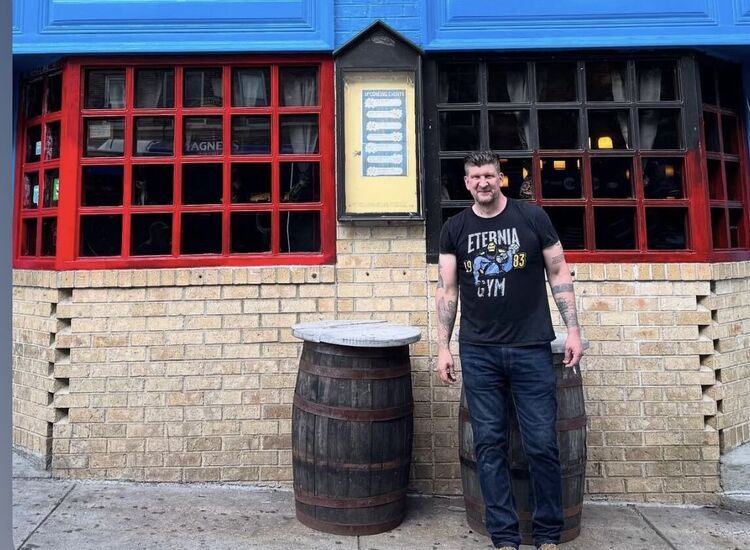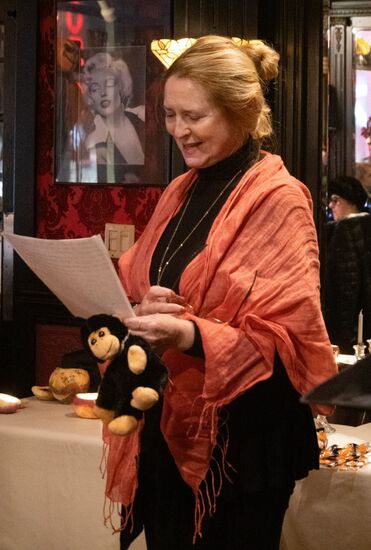By Peter McDermott
It's nice to be ahead of the Times, to quote one part of a Newsday ad from many years ago. The Gray Lady caught up with the Rev. Kevin Madigan, the pastor of St. Peter's Church in Lower Manhattan, a full six weeks after he graced the front page of this paper. In the New York Times' story of Oct. 7, the priest argued forcefully for the right to build an Islamic center on Park Place, two blocks from Ground Zero. He pointed to the unhappy story of discrimination against Catholics in the 18th and 19th centuries in America, including in the earliest years of the Republic the first parishioners of St. Peter's, which is one block from today's Ground Zero. On one occasion 204 years ago, the parishioners' neighbors found their celebration of Christmas to be offensive for some reason (and, though don't tell Bill O'Reilly, the Puritans certainly would have seen it as blasphemous).
Over the next day or so, the piece attracted 241 comments, showing that the controversy hasn't gone away. Many were sympathetic to Madigan's position, seeing the whole issue in terms of religious and cultural tolerance. Some, indeed, even expressed gratitude for the historical lesson and reminder.
But then there were others who said that there was a "big difference" in that Catholics hadn't been involved in the mass killings of Protestants in the years before St. Peter's was established. That begs the question: what if some Catholics had been? Or, what if the United States, a self-consciously Protestant country, had been at war with a Catholic nation. Would that have justified further bias against a people of a minority faith who had made the United States their home?
The U.S. was later to go to war against Mexico. Would it have been fair if Irish Catholics, for example, had been victimized because soldiers of that ethnic and religious background (the Batallón San Patricio) had thrown in their lot with the enemy?
There are never exact or easy parallels in history. Notre Dame historians of the Catholic Church in America R. Scott Appleby and John T. McGreevy made this qualifying point in their excellent essay (discussed previously in these pages) on the issue of the "Ground Zero mosque" in the New York Review of Books. But generally they argued the picture is a very familiar one on a number of levels.
The Protestants had their own reasons, their own version of a "big difference." Suspicion, distrust and ignorance were then sustained by the spread of misinformation. These days, misinformation can go viral within hours. I doubt that the anti-Park51 demonstrations would have been possible without it.
Generally, the more one studies it, the more it becomes clear the "sensitivity" argument is terribly fragile if not buttressed by certain preconceptions and prejudices, if not outright bigotry.
In the same issue that Fr. Madigan featured on the front page (Aug. 25-Sept. 1), the Echo asked in an editorial if Muslims were to be fully embraced as Americans or to be consigned to 2nd class citizenship. It went on to suggest that the campaign against Park51 was an example of group blame and collective guilt.
Yet, the opponents are quite open about their view that the calamity of 9/11 was committed "in the name of Islam" so therefore an Islamic center should not be near Ground Zero. This runs counter to the spirit of national security policy, which, from the moment the U.S. was attacked, aimed to deprive the 19 mass murderers and their organization the claim that they were acting on behalf of a major world religion. This, of course, is counter-terrorism 101. It's so basic that, by apparently forgetting it, Newt Gingrich has shown himself to be unfit for the office of the presidency.
What if all Catholics were targeted because some others did bad things in the name of their religion? Or all Baptists or all Buddhists? We could extend the logic to political ideologies. Timothy McVeigh, who killed 168 people in Oklahoma City in 1995, was pro-gun and anti-government, and he worried about taxes and the slide towards "socialism." Should all those who hold such "libertarian" and "patriotic" ideas be suspect? Should the Tea Party be told that it might be insensitive to open offices too close to a federal building?
These rhetorical questions seem to me just as pertinent as "What if the Japanese were allowed to build at Pearl Harbor?", which we've heard numerous times in recent months. Contained within it is the implication that all Muslims should have enemy combatant status alongside "the Japanese." It ignores, too, that migrants from Japan had been settling in Hawaii for more than 50 years before the United States was attacked on Dec. 7, 1941, just as we've had mosques in Lower Manhattan for decades. (There was, additionally, an Islamic prayer room in the towers destroyed on 9/11.)
And while we're in the vicinity of the threat from the Far East, it's worth noting that Japanese militaristic nationalism was underwritten by its reading of Buddhism. But that was a long time ago, and the Dalai Lama of Tibet doesn't have to worry about being on a no-fly list.
I spoke to a devout Muslim of Bangladeshi parentage outside 51 Park Place at the height of the media storm. He was a working stiff who evoked Jackie Gleason in "The Honeymooners" more than any movie cliché of a Muslim. "9/11 broke our hearts," he told me. He added that he would never have supported the building of a center that abutted Ground Zero. But he pointed out that Park51 is out of sight on a busy street that has a strip club and an OTB and is close to several bars.
There are no such businesses on the grounds of Auschwitz, where the Carmelite nuns opened a convent in the 1980s. I mention it because some commentators would rather move the discussion away from the history of religious tolerance in their own country to that incident in another continent, which has a whole set of other issues and complicating side controversies. It's a model of "compromise," they say. Well, that's convenient, as the very reluctant nuns eventually moved to an alternative site - encouraged to do so by Pope John Paul II who had the religious authority, and added legitimacy as a Pole, to make that call from Rome.
"Many Catholics, not just in Poland, could not understand how nuns begging God's forgiveness and praying for the souls of the departed could possibly offend anyone," William McGurn wrote in the Wall Street Journal.
Somehow, he managed to avoid the elephant in the room. The pope took seriously the task of dealing with the legacy of anti-Semitism in Europe, in accordance with the church's mission since Vatican II in the 1960s. And so the convent moved 600 yards to a complex that also contained an interfaith center.
McGurn, who was President George W. Bush's chief speechwriter, calls the Park Place controversy a "clash not only between different faiths but between competing historical narratives." A clash between faiths? In stark contrast to that view, one commentator suggested in a Catholic publication recently that if a religious minority is to be deprived of its rights then the proper Gandhian response might be for all places of worship to withdraw from the vicinity of Ground Zero.











